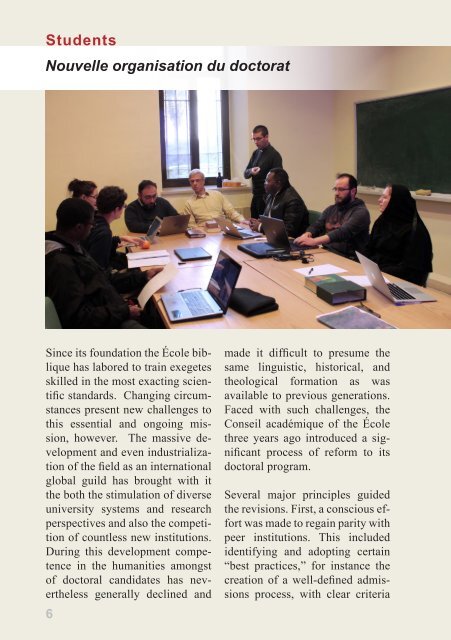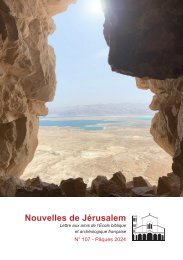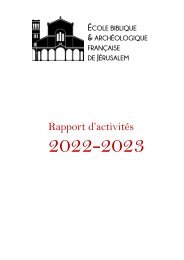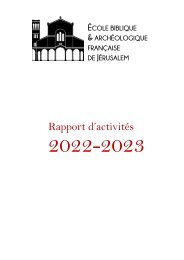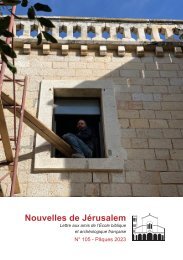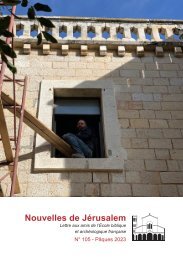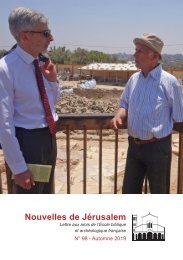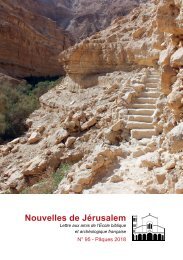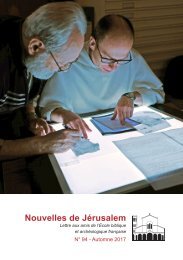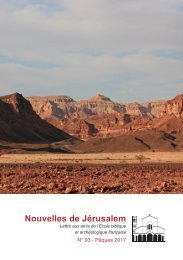Create successful ePaper yourself
Turn your PDF publications into a flip-book with our unique Google optimized e-Paper software.
Students<br />
Nouvelle organisation du doctorat<br />
and procedures for acceptance. At<br />
the same time, an effort was made<br />
to develop a distinctive program<br />
profile that would help mark out<br />
the École as a place of recognized<br />
excellence and special academic<br />
focus. Alongside the traditional<br />
role of the topography course,<br />
a special series of examinations<br />
on the ancient versions (i.e. MT,<br />
DSS, Targums, LXX, Vulgate)<br />
was introduced to this end. The<br />
principle goal in all of the revisions,<br />
of course, was to improve<br />
the quality of students’ formation<br />
as the Church’s professional interpreters<br />
of the scriptures.<br />
research apprenticeship, promoting<br />
student’s technical skills, while<br />
also enhancing familiarity with<br />
broad methodologies, literature, and<br />
themes. In the face of a field continually<br />
fragmenting into a loose confederation<br />
of micro-disciplines, this<br />
is a moment in the program prior to<br />
the formal proposal of a dissertation<br />
project, meant to counteract an<br />
over-hasty over-specialization. It is<br />
our hope and conviction that these<br />
seminars will significantly help us<br />
better serve the Church by preparing<br />
more well-rounded seminary<br />
professors and researchers.<br />
Since its foundation the École biblique<br />
has labored to train exegetes<br />
skilled in the most exacting scientific<br />
standards. Changing circumstances<br />
present new challenges to<br />
this essential and ongoing mission,<br />
however. The massive development<br />
and even industrialization<br />
of the field as an international<br />
global guild has brought with it<br />
the both the stimulation of diverse<br />
university systems and research<br />
perspectives and also the competition<br />
of countless new institutions.<br />
During this development competence<br />
in the humanities amongst<br />
of doctoral candidates has nevertheless<br />
generally declined and<br />
made it difficult to presume the<br />
same linguistic, historical, and<br />
theological formation as was<br />
available to previous generations.<br />
Faced with such challenges, the<br />
Conseil académique of the École<br />
three years ago introduced a significant<br />
process of reform to its<br />
doctoral program.<br />
Several major principles guided<br />
the revisions. First, a conscious effort<br />
was made to regain parity with<br />
peer institutions. This included<br />
identifying and adopting certain<br />
“best practices,” for instance the<br />
creation of a well-defined admissions<br />
process, with clear criteria<br />
One important new element in the<br />
program, first implemented this<br />
semester, is a full year of mandatory<br />
doctoral seminars: four total<br />
courses (2 NT, 2 OT) spread over<br />
two semesters. These seminars are<br />
conceived of as intensive reading<br />
and discussion-oriented courses and<br />
participants are expected to write<br />
a research paper to be presented<br />
and discussed during the course.<br />
Together these four seminars are<br />
meant to serve as a kind of advanced<br />
Fr. Anthony Giambrone, OP<br />
Professor at the École biblique<br />
6 Lettre aux amis de l’EBAF - N° 97 - Pâques <strong>2019</strong>


